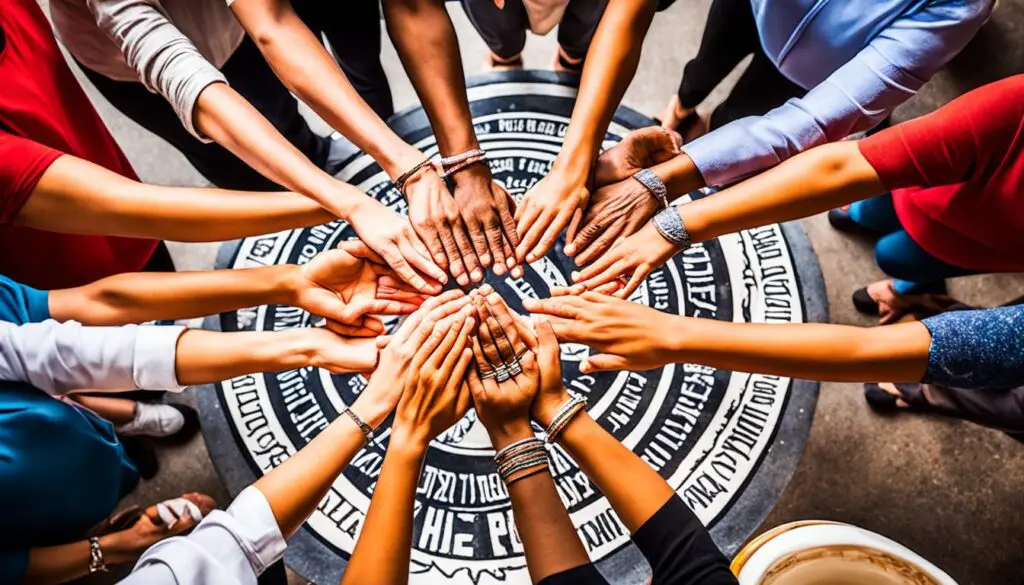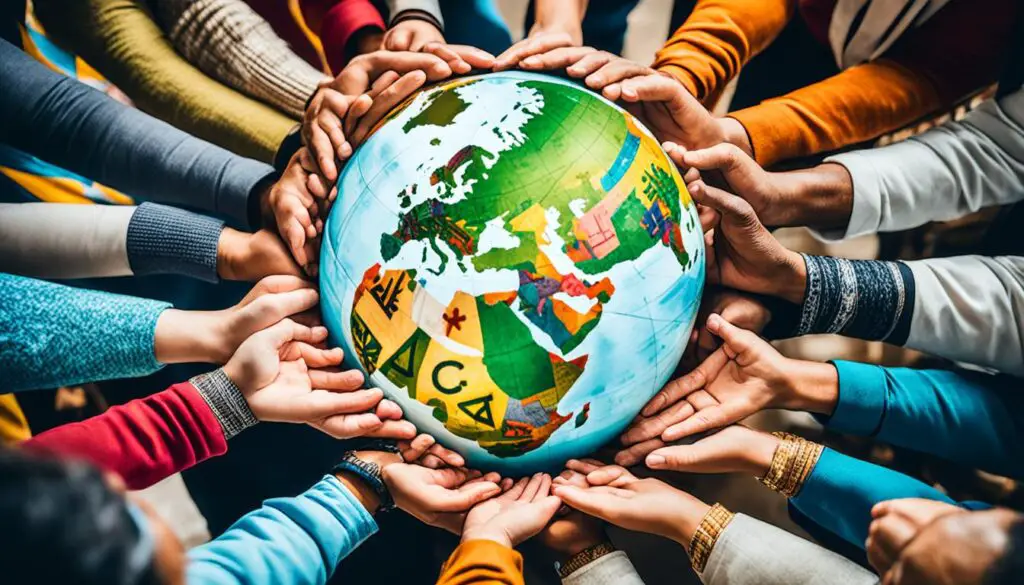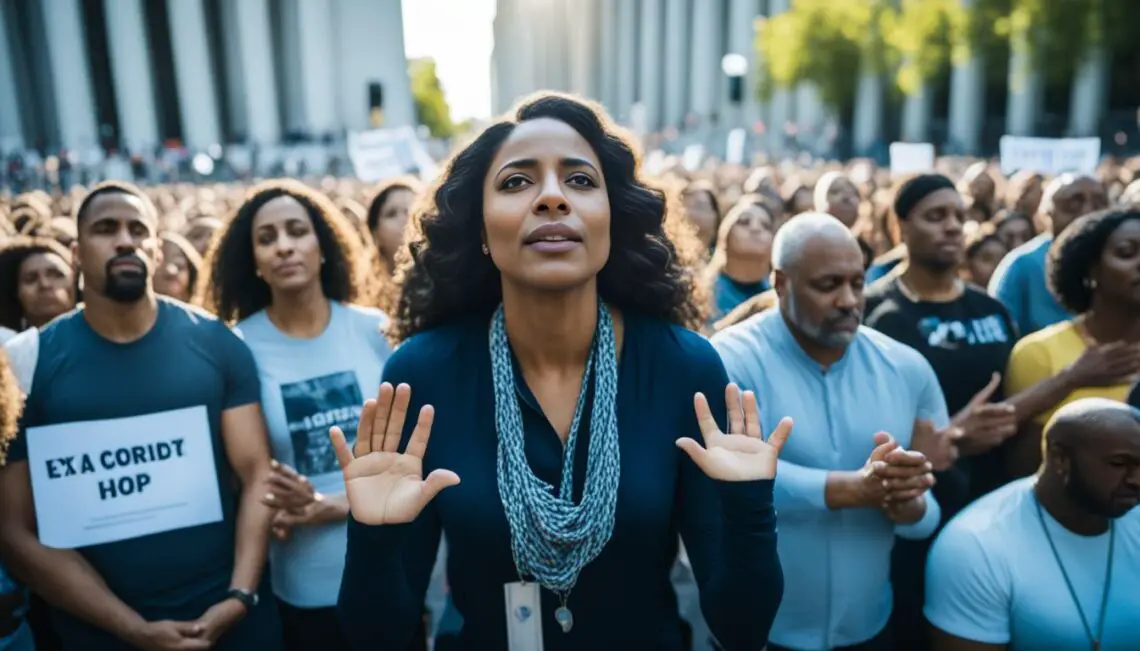In a world where inequalities persist and many vulnerable individuals and communities face injustice on a daily basis, the power of prayer has the potential to ignite change and bring about social justice. Through prayer, we can find solace, inspiration, and the strength to stand up for those who are marginalized, oppressed, and underprivileged.
Prayer for justice for the poor and helpless is an expression of our deep-seated compassion and empathy. It is a call to action that transcends borders and unites people from all walks of life in standing against injustice. By directing our prayers towards creating a fair and equitable society, we contribute to the greater good and strive towards a world in which everyone is treated with dignity and respect.
Key Takeaways:
- Prayer can be a powerful tool for advocating social justice and equality.
- Through prayer, we can find the inspiration to champion the causes of the marginalized and oppressed.
- Prayer serves as a catalyst for compassion, fairness, and empathy towards the voiceless.
- By combining prayer with tangible actions, we can create meaningful and lasting change in society.
- Prayer unites individuals and communities in the pursuit of justice for the underprivileged and disadvantaged.
Understanding Social Justice
In today’s world, social justice is a crucial concept that aims to create a fair and equal society for all. It is a call for equality, respect, and dignity, seeking to address the systemic injustices faced by various marginalized and oppressed groups. To bring about meaningful change, prayer plays a significant role in advocating for social justice.
Prayer for equality is a powerful tool that allows individuals to connect with their spirituality and call upon a higher power to intervene on behalf of the marginalized and underprivileged. It goes beyond passive observance and compels individuals to take action, to challenge oppressive systems, and to work towards a society where every person is treated with fairness and equity.
Through prayer, we can seek divine guidance to dismantle the barriers that perpetuate marginalization, discrimination, and inequality. It enables us to recognize the inherent worth and dignity of every individual, fostering empathy and compassion for those who have been oppressed.
Prayer for the marginalized offers solace and empowerment to those who have been pushed to the fringes of society, giving them hope, strength, and a renewed sense of worth. It encourages us to stand alongside them, to advocate for their rights, and to challenge the oppressive systems that keep them trapped in cycles of poverty and marginalization.
Prayer for the oppressed gives voice to those whose voices have been silenced, amplifying their stories, struggles, and aspirations. It serves as a call to action, prompting us to work relentlessly towards dismantling oppressive structures and creating a more just and equitable world.
Prayer for the underprivileged calls forth our responsibility to address the systemic barriers that prevent access to basic needs and opportunities for the less fortunate. It compels us to work towards a society where every individual has access to education, healthcare, housing, and economic opportunities, regardless of their socioeconomic background.
Understanding social justice is crucial for individuals and communities to actively engage in creating a fair and equitable society. By embracing prayer for equality, the marginalized, the oppressed, and the underprivileged, we can become agents of change, igniting compassion, empathy, and justice in our hearts and communities.
The Power of Prayer
In the journey towards social justice, prayer holds immense power. It is a transformative force that can inspire compassion, fairness, and justice for the voiceless. Prayer connects us to something greater than ourselves and empowers us to take action in pursuit of a more equitable world.
When we engage in prayer for compassion, we open our hearts to the struggles and pain of others. We cultivate empathy and a deep understanding of the injustices faced by the marginalized and underprivileged. Through prayer, we are reminded of the universal bonds that connect us all, prompting us to strive for fairness and equal rights for every individual.
Prayer also gives a voice to the voiceless. It amplifies their stories and brings attention to their struggles. As we fervently pray for the voiceless, we become advocates for change, speaking out against injustice and working towards a society where everyone’s voice is heard and valued.
Combining prayer with action is crucial in driving social change. Prayer can inspire us to seek solutions, engage in meaningful dialogue, and support organizations and initiatives dedicated to social justice. Through prayer, we find the strength and motivation to address systemic inequalities, challenge oppressive systems, and create a world where no one is left behind.

Prayer for the Needy and Disadvantaged
During moments of hardship and struggle, it is essential to offer prayers for the needy and disadvantaged. These individuals face unique challenges that require our support and a compassionate approach. Prayer allows us to seek justice on their behalf and offer solace in times of difficulty.
Prayer for the needy is a way to acknowledge their struggles and empathize with their pain. It is an opportunity to uplift their spirits and provide them with comfort in their time of need. Through prayer, we can connect with their experiences and offer our love, understanding, and kindness.
Similarly, prayer for the disadvantaged draws attention to their circumstances and the obstacles they face daily. It is a means to advocate for their rights, equality, and access to opportunities. By lifting these concerns up in prayer, we can create awareness and work towards justice on their behalf.
In our prayers, we can emphasize the importance of compassion and support for the needy and disadvantaged. We can ask for guidance in finding tangible ways to help, whether through volunteering, donations, or advocating for change. Through our prayers, we can become instruments of compassion and agents of transformation.
Advocating for Change
In our collective pursuit of social justice, prayer can serve as a powerful instrument of advocacy. Through prayer, we can elevate our voices, raise awareness, and inspire transformative actions for the marginalized and oppressed.
Prayer has the ability to ignite a spark within us, urging us to stand up against inequality and seek justice for those who have been marginalized. It opens our hearts to the plight of the disadvantaged and compels us to take tangible steps towards creating a more equitable society.
When we engage in prayer for social justice, we not only heighten our own awareness but also foster dialogue within our communities. By coming together in prayer, we create a space for open and honest conversations about systemic injustices and the ways in which we can work collectively for change.
Prayer as a Catalyst for Mobilization
Prayer possesses a unique ability to mobilize individuals and communities towards action. It ignites a fire within us, urging us to lend our voices and strengths to advocate for the marginalized. As we come together in prayer, we find solace and inspiration, empowering us to address the root causes of inequality and work towards a fairer society.
Through prayer, we can find the strength and perseverance needed to challenge the status quo. It prompts us to align our actions with our commitments, ensuring that we remain dedicated to the pursuit of justice for the marginalized.
Prayer: Amplifying the Voices of the Marginalized
In advocating for change, prayer provides a platform for the voices of the marginalized and oppressed to be heard. It encourages us to lend our support, amplifying these voices and promoting empathy within our communities.

By engaging in prayer for the marginalized, we embrace the responsibility to listen, learn, and advocate for those who have been silenced by systems of power. Through focused prayer, we can call upon our collective strength to challenge discrimination, eradicate poverty, and dismantle barriers that prevent equal opportunities.
Let us unite in prayer, nurturing empathy and compassion within ourselves and inspiring others towards social justice. Let our prayers be the catalysts for real, lasting change.
Prayer in Action
Real-life examples demonstrate the transformative power of prayer in inspiring activism and empowering marginalized groups. Prayer can serve as a catalyst for social change and bring hope to the oppressed and underprivileged.
In communities around the world, individuals and groups have harnessed the power of prayer to address social injustices and advocate for the rights of the marginalized. These prayers, deeply rooted in compassion and empathy, have sparked movements, inspired activism, and uplifted those who have been silenced by society.
One such example is the prayer-led initiatives to combat poverty and homelessness. Individuals and religious organizations have come together to offer shelter, food, and support to those in need, fueled by their prayers for justice and compassion.
Similarly, prayer networks have risen to support marginalized communities facing discrimination and oppression. By praying for equality and justice, these groups have amplified the voices of the voiceless and advocated for systemic change.
Prayer has the unique ability to inspire individuals to take action and make a difference. It encourages empathy and fosters a sense of responsibility for the well-being of others. Through prayer, communities are mobilized, resources are gathered, and lasting change is made possible.
Together, through our prayers, we have the power to uplift those who have been weighed down by the burdens of injustice. By praying for the oppressed and underprivileged, we can become active participants in the journey towards a more compassionate and equitable world.
Standing in Solidarity
In the pursuit of justice for all, standing in solidarity with the marginalized and oppressed is crucial. Prayer holds the power to unite individuals in a common purpose, fostering empathy, understanding, and a shared responsibility for creating a more equitable society. Through prayer, we can advocate for equality and show compassion towards those who have been unjustly treated.
Prayer for equality encourages us to recognize our intrinsic value as human beings and to extend the same rights and opportunities to everyone, regardless of their background or circumstances. When we pray for equality, we align ourselves with the belief that all individuals should be treated with fairness, justice, and respect. Through prayer, we can mobilize our spirits and work towards dismantling discriminatory systems that perpetuate inequalities.
Similarly, prayer for compassion opens our hearts to the suffering experienced by others. It inspires us to extend kindness, love, and support to those in need. By praying for compassion, we cultivate a deep sense of empathy and are motivated to advocate for the rights and well-being of the marginalized. Through prayer, we can nurture a society that values the inherent worth of every individual and takes tangible action to alleviate their struggles.

As we stand in solidarity, let us remember that prayer is not a mere passive act but a call to action. It imbues us with a sense of responsibility to challenge injustice and create lasting change. Through prayer, we can find the courage to speak out against oppression and advocate for the rights and dignity of all. Let us embrace the power of prayer to transform our hearts, inform our decisions, and inspire us to build a more just and compassionate world for everyone.
Overcoming Challenges
When it comes to seeking justice for the disadvantaged, the path is never easy. It is often filled with obstacles and setbacks that can test our resolve. However, in the face of adversity, prayer can be a powerful tool to overcome these challenges and keep us focused on our mission of fairness and equality.
Perseverance is key when fighting for the rights of the underprivileged. Through consistent and heartfelt prayer, we can find the strength to push forward, even when the path seems impossible. Prayer helps us maintain our faith and believe in the possibility of change, no matter how difficult the circumstances may be.
Resilience is another quality that prayer cultivates within us. It allows us to bounce back from setbacks, learn from our failures, and keep moving forward. Prayer provides us with the resilience needed to continue advocating for fairness, even in the face of resistance and opposition.
Continued prayer is essential in the pursuit of justice for the disadvantaged. It keeps our hearts and minds focused on our purpose, reminding us of the importance of fighting for fairness and equality for all. Through prayer, we can find solace, guidance, and the motivation to keep standing up against injustice.
In times of doubt and discouragement, prayer serves as a source of strength and inspiration. It reminds us that we are not alone in our pursuit of justice, and that divine intervention can bring about the changes we seek. With prayer, we can overcome the challenges and continue our journey towards a more equitable and just society.
Creating Lasting Change
Prayer has the incredible potential to create lasting change in society. When we pray for justice for the poor and helpless, we tap into a powerful force that can inspire transformation on a grand scale.
One strategy for using prayer to influence policy is to join together in collective prayer gatherings. These gatherings serve as a platform for amplifying our voices and advocating for social justice. By coming together as a community, we can uplift our prayers and present a united front against systemic injustices.
Another way to create lasting change through prayer is by challenging the very systems that perpetuate inequality. As we engage in prayer for social justice, we must also be willing to confront and address the root causes of these injustices. This may involve speaking out against discriminatory practices, participating in peaceful demonstrations, or supporting organizations that are actively working to dismantle oppressive systems.
Furthermore, prayer should not be limited to our private conversations with a higher power. We can use prayer as a tool to engage with our elected officials, expressing our concerns and advocating for policies that promote social justice. By combining prayer with active civic engagement, we can make a tangible impact on the lives of the marginalized and underprivileged.
In our quest for lasting change, it’s crucial to remember that prayer is not passive; it is an active force that propels us towards social transformation. As we pray for justice, for equality, and for compassion, we cultivate within ourselves the qualities needed to effect change in our world.
Prayerful Reflection and Action
As we pray for justice for the voiceless and equality for all, it is essential to take a moment to reflect on our own prayers and the actions we can take to bring about meaningful change. Prayer is a powerful tool, but it becomes truly transformative when combined with tangible steps towards justice and equality.
When we pray for the voiceless, it opens our hearts and minds to the struggles of those who are marginalized and unheard. It ignites a fire within us to advocate for their rights and fight against the injustices they face. However, prayer alone is not enough. We must also be willing to take action and lend our voices to those who need them the most.
Prayer for equality requires a commitment to dismantling systemic barriers and pursuing justice for all. It pushes us to challenge the status quo and work towards creating a society where everyone is treated with dignity and respect.
It is through prayer that we come to understand the importance of empathy and compassion. It reminds us that we are all interconnected, and the struggles of one person affect us all. As we reflect on our prayers, we must ask ourselves how we can translate our faith into action that uplifts those who are oppressed and marginalized.
Prayerful reflection invites us to examine our own privileges and biases, encouraging us to listen to the voices that have been silenced and amplify them. It calls us to stand up against discrimination, inequality, and injustice in all its forms.
Let us remember that prayer is not passive; it is a call to action. It prompts us to become advocates, allies, and change-makers. By combining our prayers with tangible actions like supporting organizations fighting for equality, volunteering in our communities, and speaking out against injustice, we have the power to make a difference.
Prayerful reflection and action go hand in hand. Together, they enable us to bring about the transformation we seek in our society. Let us pray for the voiceless and actively work towards a world where equality reigns, justice prevails, and compassion guides our every step.
Conclusion
Prayer has the power to transform the lives of the underprivileged and create a society rooted in compassion. Through prayer, we can cultivate a deep sense of empathy and understanding for those who are marginalized and oppressed. Our prayers for justice can ignite the flame of compassion within us and inspire us to take action.
Prayer is not a passive act, but a call to actively seek fairness and equality. It moves us to stand in solidarity with those in need, advocating for their rights, and uplifting their voices. The prayerful reflection becomes the catalyst for meaningful change, as it guides us to address the underlying systems that perpetuate injustice.
As we continue to pray for the underprivileged, let us remember that prayer alone is not enough. It must be coupled with tangible actions that align with the values and principles we hold dear. It is through our collective efforts that we can create a world where compassion reigns and justice prevails. Together, let us be the driving force for a brighter and more equitable future.





